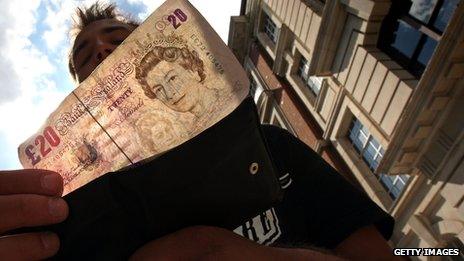So how sick was the UK?
- Published
- comments

You may recall that the government, the BBC (that's me, that is) and all the media made a big fuss at the end of July about official statistics that showed Britain's ghastly economic depression - the period during which output or GDP was below its previous peak - had just ended.
I warned at the time that this was something of a fiction. And we've had confirmation this morning that in fact the output of the country was back to its pre-crash level at least nine months earlier.
Well I say "in fact". But this assessment that we were not as mullered by the financial crisis as we thought is simply based on a new methodology - imported from the EU - for calculating GDP.
And if you have had the dubious pleasure of having to take this stuff seriously for as long as I have, it is reasonable to fear that in a few years' time we will find that the current way of measuring these things will be replaced by yet another set of rules - which may show that we were either richer or poorer than we thought we were.
And before I move on, I should point out that the current view that the depression ended in the third quarter of 2013 - and not the second quarter of 2014 - stems from revised figures for growth up to the end of 2012 and unrevised figures for 2013 and 2014.
It is completely plausible that those 2013 and 2014 figures will also be shown to be an understatement (survey data suggests growth has been stronger - as the Bank of England has been saying).
So even this latest view of how bad it's actually been may change before too long.
Does it matter that the Office for National Statistics (ONS) now calculates that output declined "only" 6% at its peak in the great debacle of six years ago, rather than its previous estimate that the economy had shrunk more than 7%?
Still pretty sick
Should we be anything but pleased that the British economy is probably 2.7% bigger than it was in the first quarter of 2008, as opposed to the estimate of just a few weeks ago that it is just a fraction bigger?
Isn't it fantastically good news that it now appears that the British economy has been performing a bit better than Germany's and way better than France's for some time, and only a bit worse than America's or Canada's?
Of course it is great to learn that we were not as sick as we thought we were - although, for the avoidance of doubt, we were still pretty sick (this was still by a significant margin the most painful and longest lasting slump since the 1930s).
But the big thing is that the official view of the health of our economy has an impact on the behaviour of businesses and consumers.
Thus, if the oracle that is the ONS had made clear a year ago that the UK had been performing for a while significantly better than many competitor economies that might have encouraged British firms to invest more and overseas investors to put more of their cash in the UK.
And that would have made all of us richer.
Or to put it another way, the perception that we are doing well helps us to perform even better, to become richer.
And of course the corollary also holds: if we are perceived to be in dire straights, no one wants to spend or invest, and we become poorer.
So the official description of our economic performance can have a significant impact on the subsequent performance of the economy.
For the avoidance of doubt, I am not claiming that we can magic ourselves richer simply by pretending that we are.
But Keynes had a point when he said that animal spirits - how we feel about ourselves - has an impact on economic behaviour that determines our prosperity.
To be clear, I am not trying to put the boot into the ONS. It has a difficult job to do, and in making its revisions is simply trying to provide more reliable information.
But you may understand that I periodically feel a bit grumpy and bewildered in having to tell you one day that the UK has gathered - by analogy - four bronzes in the economic Olympics, and then a few weeks later learn that the medal haul was in fact significantly different and better.